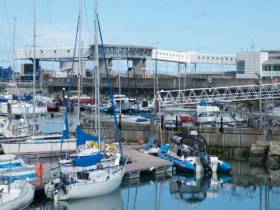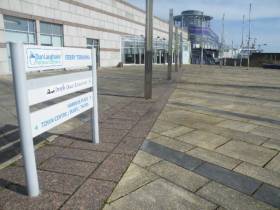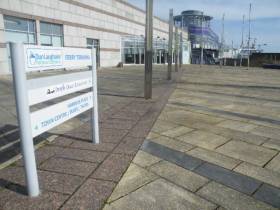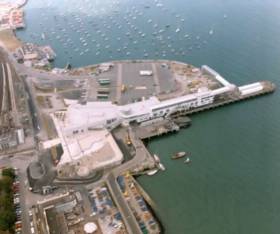Displaying items by tag: Harbour Innovation Campus
Cruise Service Bid Competes With New Tech Hub Plans For Dun Laoghaire Ferry Terminal
Speculation that a ferry service could return to Dun Laoghaire has reached fever pitch with the news that a British company has put in a bid to operate from the St Michael’s Pier terminal.
According to The Times, the Liverpool & North Wales Steamship Company, which was restarted two years ago, envisages running regular passenger cruises in the Irish Sea and will be “ready to sail” from next summer.
The ferry company’s chief executive Steve Payne plans to present his pitch to Dun Laoghaire-Rathdown County Council — the authority that now controls the harbour — by the end of this year, laying out plans for services that could employ 240 people.
Payne revealed to Afloat.ie that as well as the cruise bid involving its 650-passenger vessel, it also wants to operate a regular ferry service serving its home base of Liverpool and also Llandudno in North Wales.
The company’s flagship heritage pleasure steamer TSMV Endeavour is presently in refit in Liverpool.
However, one of the investors involved in the recently scrapped Harbour Innovation Campus proposal says he intends to push on with a tech hub scheme for the former ferry terminal.
Ian Lucey currently faces a High Court action from Harbour Innovation Campus developer Philip Gannon in a case that’s understood to be separate from Gannon’s decision to pull out of the Dun Laoghaire venture last month.
Note: This piece has been corrected to remove a previous statement that Philip Gannon and Ian Lucey were business partners. The shareholder agreement clearly states that no partnership was created. We are happy to make this clarification.
The developer behind scrapped plans for the Harbour Innovation Campus in Dun Laoghaire is taking legal action against a tech investor, as The Sunday Times reports.
Philip Gannon filed a High Court case last Wednesday (14 November) against Ian Lucey and his firm Lucey Technology citing “specific performance”, which is often an attempt to compel a party to fulfil contractual obligations.
Neither party would comment on the case, though it is understood to be separate to Gannon’s withdrawal of his Harbour Innovation Campus plans from Dun Laoghaire last month in the absence of a foreshore licence for the earmarked St Michael’s Pier site.
Previous to that, in September, Lucey wrote in a blog post on Medium that he had moved to “step back” from the project “as [Philip Gannon’s] Blond Capital undertook more management, in line with [Lucey Fund’s] model of being a small shareholder in a number of businesses.”
The Sunday Times has more on the story HERE.
Note: This piece has been corrected to remove a previous statement that Philip Gannon and Ian Lucey were business partners. The shareholder agreement clearly states that no partnership was created. We are happy to make this clarification.
Harbour Innovation Campus Plans For Dun Laoghaire Scrapped Due To Lack Of Foreshore Licence
Ambitious plans for a digital technology hub at the former Dun Laoghaire ferry terminal have been scrapped by its developer in the absence of the necessary foreshore licence.
As recently as August, the Harbour Innovation Campus project was moving forward after securing planning permission almost a year after the scheme was announced.
However, in an email to interested parties as seen by Afloat.ie this evening (Monday 29 October), developer Philip Gannon said that a year after signing the lease on the former terminal building, “the landlords have still not secured the foreshore licence necessary to allow them to legally lease the building to us.
“Needless to say I am appalled by this fact, given all of the time and trouble that I put into this project. I spent nine months finding a suitable fit-out team that were due to start in January.
“When I told them that work could not commence until a foreshore licence was granted, they told me they don’t do ‘stand-by’ and would be starting on another project in the new year instead.”
Citing uncertainty surrounding the foreshore licence, and the difficulties involved in putting together a new fit-out team, Gannon said: “I felt that I had no option but to terminate the lease and find an alternative property elsewhere.”
He added: “I deeply regret that in the end, I was unable to make this vision a reality in Dun Laoghaire.”
As previously reported on Afloat.ie, Gannon had been intending to invest €20 million in transforming the St Michael’s Pier building into the largest technology hub in Ireland, supporting up to 50 companies and as many as 1,000 jobs.
Dun Laoghaire Waterfront To Host ‘Ireland’s Largest Innovation Campus’
#DLHarbour - Reservations are now being taken for co-working spaces on Dun Laoghaire’s waterfront at what’s being touted as ‘Ireland’s largest innovation campus’.
As many as 1,000 workers will benefit from the facilities at the Harbour Innovation Campus at St Michael’s Pier, which is set to open in July next year.
Full time members can reserve a dedicated desk from €250 a month (€300 per member for a team space) with benefits including secure lockers, conference rooms and super-fast WiFi, as well as access to on-site mentors, start-up incubation, R&D labs, maker spaces and more.
More information is available in the campus’ online prospectus HERE.
Previously the former Stena HSS ferry terminal at St Michael’s Pier was made available to rent, following a partnership between the harbour company and online space-letting platform Fillit.
More recently, a “cluster of floating affordable homes” has been mooted for the adjacent Coal Harbour Dock, as reported last month on Afloat.ie.



























































